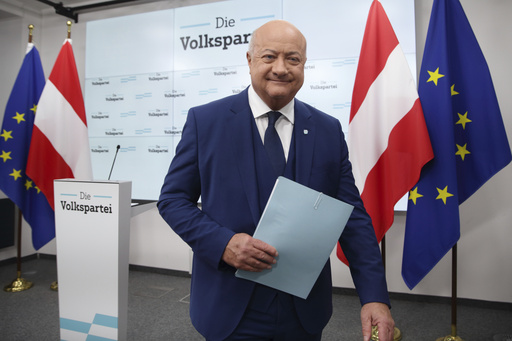
VIENNA — The initiative by Herbert Kickl, the leader of the far-right Freedom Party, to create a coalition government with a conservative party has unraveled amidst a flurry of accusations, just over four months after his party emerged victorious in the national election.
Austria’s president had tasked Kickl last month with the responsibility of forming a new governing body, marking the first time since World War II that a far-right party would potentially lead the country. However, efforts by other political factions to forge a coalition without the Freedom Party had previously faltered.
On Wednesday, Kickl notified President Alexander Van der Bellen of his decision to withdraw from the mandate as negotiations appeared increasingly strained during recent discussions with the Austrian People’s Party. The atmosphere between the two parties had grown tense, leading to Kickl’s eventual resignation from the task.
The Freedom Party, known for its staunch anti-immigration stance and opposition to sanctions against Russia, achieved 28.8% of the votes in September’s parliamentary elections, surpassing the People’s Party led by then-Chancellor Karl Nehammer.
After months of negotiations, Nehammer’s party, unwilling to partner with the Freedom Party, was eventually given the chance to form a government in October. This collaborative effort deteriorated, resulting in Nehammer’s resignation in January, which opened the door for interim Chancellor Alexander Schallenberg.
In a statement released by the Freedom Party, Kickl indicated that the failure of the most recent talks was primarily due to the People’s Party, citing unresolved policy disputes and a lack of agreement on the distribution of ministerial responsibilities.
Kickl expressed his regret over abandoning the coalition negotiations, remarking that there seemed to be no viable path forward, especially with regard to approaching the center-left Social Democrats, the only other party capable of forming a parliamentary majority with the Freedom Party.
“The time for Austria is running out,” he insisted, reinforcing his party’s skepticism towards the European Union, its opposition to EU assistance for Ukraine, and its demand for a return of certain powers to Austria.
Austrian People’s Party leader Christian Stocker reiterated his party’s stance, emphasizing the need to safeguard Austria’s sovereignty, prevent foreign interference—particularly from Russia—and uphold the principles of liberal democracy and a reliable role within the EU.
He raised concerns regarding the potential threat to national security if the Freedom Party gained control over the interior ministry, citing warnings from foreign allies against cooperation with Austria’s intelligence agency due to the party’s controversial history. He attributed the breakdown of talks to Kickl’s “attitude” during negotiations.
The Freedom Party and People’s Party have both been keen on controlling the Interior Ministry, with the Freedom Party seeking to tighten migration and asylum laws.
Upon learning from Kickl about the failed coalition efforts, President Van der Bellen acknowledged the diminishing willingness to compromise among the parties involved. He outlined four potential paths for moving forward: fresh elections—which would likely be delayed until June due to legal stipulations—forming a minority government, establishing a caretaker government, or reconvening coalition discussions among the remaining parties.
Van der Bellen committed to engaging with relevant political figures to explore the most promising option.
Political analyst Peter Filzmaier remarked that the coalition discussions had devolved into a “bizarre drama” in public view. A leaked confidential document detailing the state of negotiations revealed substantial divides between the parties, especially regarding foreign policy and the European Union.

